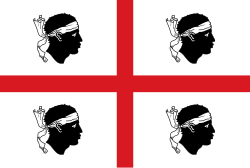This article needs additional citations for verification .(April 2025) |
 |
|---|
|
This is the list of presidents of Sardinia since 1949.
This article needs additional citations for verification .(April 2025) |
 |
|---|
|
This is the list of presidents of Sardinia since 1949.
| № | Name | Term of office | Political party | Legislature | ||
|---|---|---|---|---|---|---|
| 1 | Luigi Crespellani | 31 May 1949 | 3 July 1953 | DC | I (1949) | |
| 3 July 1953 | 21 January 1954 | II (1953) | ||||
| 2 | Alfredo Corrias | 21 January 1954 | 21 June 1955 | DC | ||
| 3 | Giuseppe Brotzu | 21 June 1955 | 2 July 1957 | DC | ||
| 2 July 1957 | 13 November 1958 | III (1957) | ||||
| 4 | Efisio Corrias | 13 November 1958 | 3 July 1961 | DC | ||
| 3 July 1961 | 3 July 1965 | IV (1961) | ||||
| 3 July 1965 | 16 March 1966 | V (1965) | ||||
| 5 | Paolo Dettori | 16 March 1966 | 14 February 1967 | DC | ||
| 6 | Giovanni Del Rio | 14 February 1967 | 3 July 1969 | DC | ||
| 3 July 1969 | 2 February 1970 | VI (1969) | ||||
| 7 | Lucio Abis | 2 February 1970 | 5 January 1971 | DC | ||
| 8 | Antonio Giagu De Martini | 5 January 1971 | 11 February 1972 | DC | ||
| 9 | Pietro Soddu | 11 February 1972 | 18 March 1972 | DC | ||
| 10 | Salvator Angelo Spanu | 18 March 1972 | 7 December 1972 | DC | ||
| (8) | Antonio Gagiu De Martini | 7 December 1972 | 10 December 1973 | DC | ||
| (6) | Giovanni Del Rio | 10 December 1973 | 3 July 1974 | DC | ||
| 3 July 1974 | 8 May 1976 | VII (1974) | ||||
| (9) | Pietro Soddu | 8 May 1976 | 31 July 1979 | DC | ||
| 11 | Mario Puddu | 31 July 1979 | 25 September 1979 | DC | VIII (1979) | |
| 12 | Alessandro Ghinami | 15 September 1979 | 7 October 1980 | PSDI | ||
| (9) | Pietro Soddu | 7 October 1980 | 12 November 1980 | DC | ||
| (11) | Mario Puddu | 12 November 1980 | 4 December 1980 | DC | ||
| 13 | Francesco Rais | 4 December 1980 | 18 May 1982 | PSI | ||
| 14 | Mario Melis | 18 May 1982 | 16 June 1982 | PSd'Az | ||
| 15 | Angelo Rojch | 16 June 1982 | 24 August 1984 | DC | ||
| (14) | Mario Melis | 24 August 1984 | 8 August 1989 | PSd'Az | IX (1984) | |
| 16 | Mario Floris | 8 August 1989 | 13 November 1991 | DC | X (1989) | |
| 17 | Antonello Cabras | 13 November 1991 | 5 August 1994 | PSI | ||
Note: Until 2004, Presidents could resign or lose a vote of confidence, and be replaced by the Regional Council.
| N. | Portrait | President | Term of office | Tenure (Years and days) | Party | Coalition | Legislature | Ref. | ||
|---|---|---|---|---|---|---|---|---|---|---|
| 18 |  | Federico Palomba (1937– ) | 5 August 1994 | 9 August 1999 | 5 years, 4 days | PDS | PDS–PRC–FD | XI (1994) | ||
| 19 |  | Mauro Pili (1966– ) | 9 August 1999 | 18 October 1999 | 70 days | FI | FI–AN–RS–CCD | XII (1999) | ||
| 20 | | Gian Mario Selis (1944– ) | 18 October 1999 | 16 November 1999 | 29 days | PPI | PDS–PPI–FD–Dem–SDI–PRC | |||
| (16) | | Mario Floris (1937– ) | 16 November 1999 | 25 October 2001 | 1 year, 343 days | UDR | PDS–DL–UDR–FD–Dem–SDI–PRC | |||
| (19) |  | Mauro Pili (1966– ) | 25 October 2001 | 28 August 2003 | 1 year, 307 days | FI | FI–AN–RS–CCD | |||
| 21 | | Italo Masala (1937– ) | 28 August 2003 | 26 June 2004 | 303 days | AN | ||||
| 22 |  | Renato Soru (1957– ) | 26 June 2004 | 27 February 2009 | 4 years, 246 days | DS PD | PD–PS–PRC–SDI–UDEUR–PdCI–IdV | XIII (2004) | ||
| 23 |  | Ugo Cappellacci (1960– ) | 27 February 2009 | 12 March 2014 | 5 years, 13 days | PdL FI | PdL–UDC–RS–PSd'Az | XIV (2009) | ||
| 24 |  | Francesco Pigliaru (1954– ) | 12 March 2014 | 20 March 2019 | 5 years, 8 days | PD | PD–SEL–PdS–RM–CD–PRC– UPC–PSI–IdV–FdV–iRS–LB | XV (2014) | ||
| 25 |  | Christian Solinas (1976– ) | 20 March 2019 | 20 March 2024 | 5 years, 0 days | PSd'Az | Lega–PSd'Az–FI–RS–FdI–UDC | XVI (2019) | ||
| 26 |  | Alessandra Todde (1969– ) | 20 March 2024 | Incumbent | 1 year, 255 days | M5S | PD–M5S–AVS–OC–PP–SF–PSI | XVII (2024) | [1] | |